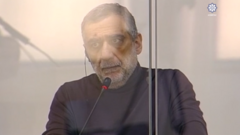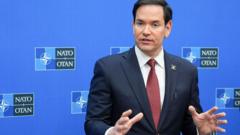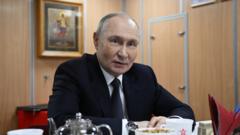Amidst ongoing conflict, many Russian expatriates remain skeptical about their potential return home, fearing a lack of change in the country's political climate.
Russian Exiles Doubt Peace Deal Will Bring Them Home

Russian Exiles Doubt Peace Deal Will Bring Them Home
As cease-fire talks continue, Russian émigrés doubt their future in a post-war Russia.
In Istanbul, the haunting legacy of war weighs heavily on the hearts and minds of hundreds of thousands of Russian expatriates who fled their homeland after the onset of the Ukraine conflict. Even as discussions for a possible peace agreement advance, many maintain a pervasive fear of returning to a country they left to escape bleak prospects under President Vladimir V. Putin’s regime.
In an intriguing remark, former President Trump expressed confidence in Putin's commitment to any negotiated outcome. However, for those who have experienced the swift political repression that propelled their exodus, this outlook seems misplaced. "The war will only end when Putin is gone," asserts Pavel Snop, a former real-estate agent now residing in Turkey after leaving St. Petersburg. "His negotiations seem aimed at ensuring sanctions relief for himself and those in his inner circle, not for the good of the Russian population."
This demographic shift—approximately 800,000 Russians, many of whom are professionals in the academic and technical realms—serves as a stark reminder of dissent against the ongoing war. Economists caution that this brain drain presents dire challenges to Russia’s economy, which increasingly struggles to retain talent within its borders.
The cessation of hostilities remains a distant hope for many who have established lives abroad, keenly aware that a peace accord may not usher in a transformative political environment back home. For these exiles, the path to repatriation is fraught with uncertainty, casting shadows over their aspirations for the future.
In an intriguing remark, former President Trump expressed confidence in Putin's commitment to any negotiated outcome. However, for those who have experienced the swift political repression that propelled their exodus, this outlook seems misplaced. "The war will only end when Putin is gone," asserts Pavel Snop, a former real-estate agent now residing in Turkey after leaving St. Petersburg. "His negotiations seem aimed at ensuring sanctions relief for himself and those in his inner circle, not for the good of the Russian population."
This demographic shift—approximately 800,000 Russians, many of whom are professionals in the academic and technical realms—serves as a stark reminder of dissent against the ongoing war. Economists caution that this brain drain presents dire challenges to Russia’s economy, which increasingly struggles to retain talent within its borders.
The cessation of hostilities remains a distant hope for many who have established lives abroad, keenly aware that a peace accord may not usher in a transformative political environment back home. For these exiles, the path to repatriation is fraught with uncertainty, casting shadows over their aspirations for the future.





















